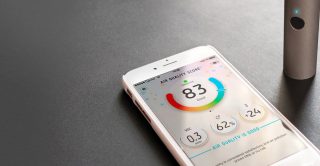 Dr Andy Skinner and Chris Stone believe that new technology has the potential to transform health data collection in the longitudinal community – and that there are already promising signs of this among early adopters.
Dr Andy Skinner and Chris Stone believe that new technology has the potential to transform health data collection in the longitudinal community – and that there are already promising signs of this among early adopters.
In the last decade or so advances in bioinformatics have made it easier for health researchers to study people’s genetic make-up (genotype) in detail. For example, it is now possible – and has become almost routine – for health researchers to identify genes associated with specific diseases using genome-wide association studies.
But our ability to explore a person’s physiological and mental states and behaviours (phenotype) now lags some way behind.
New technology offers perhaps the greatest potential to catch up. Advances in areas such as mobile and wearable sensing devices, video technologies and machine learning, allow researchers to collect and process phenotypic data with greater detail, in more natural settings, over longer periods of time, and with lower cost and participant burden than ever before.
For cohort and longitudinal studies, these technological advances mean it is possible to embed the extended capture of detailed health data into participants’ everyday lives. Physical activity, environmental factors, biomarkers and questionnaire responses can all be captured and processed by personal digital devices, and ubiquitous mobile networks enable near instantaneous transmission of this data to the researcher.
These new methods are not without their challenges. Harvesting large volumes of personal data in free-living conditions raises questions of ethics, data privacy and security. Partnering with the participant is essential for obtaining the consent necessary for ongoing longitudinal investigation. And careful consideration needs to be given to the handling of the data captured. Large volumes of sensitive data can be generated, and this needs to be stored and processed securely to protect the rights of the individual, and to satisfy data protection requirements.
Nevertheless, the gains to be made from the use of new technology are considerable. Techniques such as ecological momentary assessment utilise the smartphones we carry with us every day to collect data “in the moment”, and could provide detailed, ecologically valid patterns of, say, mental health. The sensors now found in smartwatches can supplement this with data that can be used to monitor physical and cognitive decline. Advances in personal bio-sensing will soon enable smartphones to collect a wide range of data in the home. An individual’s use of social media can build a picture of how they interact with their social environment.
Together, these new techniques, driven by advances in technology, enable researchers to extend the breadth and depth of health measures that can be captured in cohort and longitudinal studies.
All the CLOSER studies use new technologies to a greater or lesser extent. Many have used wearable accelerometers to measure physical activity. Participants in the Millennium Cohort Study were asked to complete diaries via a smartphone app or online. And the Avon Longitudinal Study or Parents and Children has trialled a number of new methods, including head cameras to monitor parent/child interactions and continuous glucose monitoring during pregnancy. But there is plenty of room to do more and to share our learnings and experiences.
In 2017 a CLOSER workshop hosted by the University of Bristol brought together researchers and parties interested in this area to share knowledge on current activity and new developments. Our report of the workshop’s outcomes captures these discussions, highlights where new technology is being used by studies within CLOSER and identifies priorities for further research in this area.
The new methods that were discussed represent major advances in the way cohort and longitudinal studies capture health data. When deployed more widely, they will provide us with data that could result in a step change in understanding the evolution of health and disease, enabling better causal understanding, earlier intervention and ultimately real improvements in health.
Download ‘New technology and novel methods for capturing health-related data in longitudinal and cohort studies’, which summarises a CLOSER workshop on the same subject.
Dr Andy Skinner and Chris Stone are researchers at the University of Bristol’s MRC integrative Epidemiology Unit.
Suggested citation:
Skinner A & Stone C (2018) “Greater use of new technology to collect data can revolutionise longitudinal studies.”, CLOSER blog.
